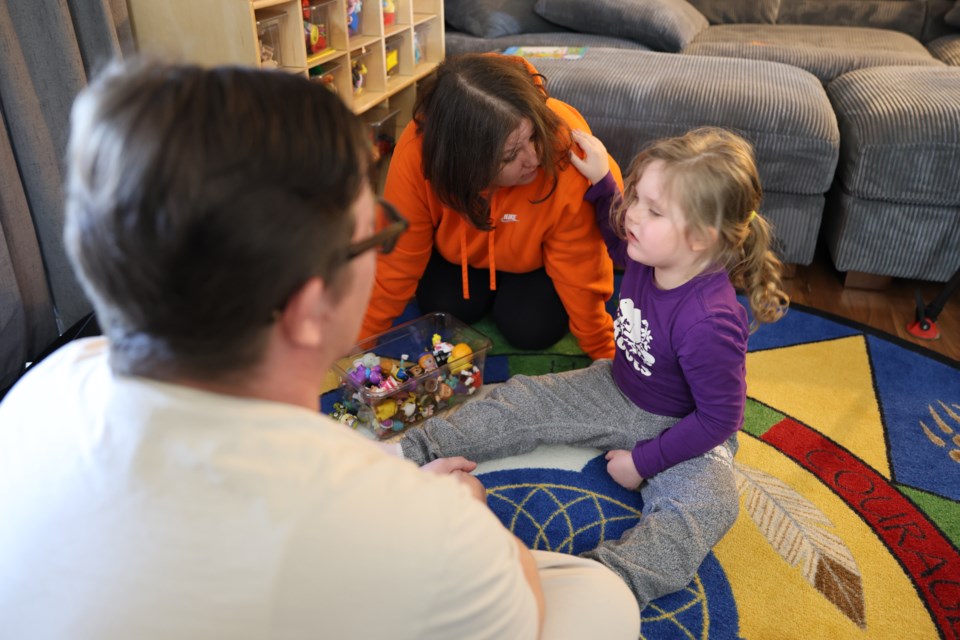THUNDER BAY — A behavioural therapy specialist in the city says she alone is working with 10 families who are all awaiting word on whether their children's autism therapy will be funded.
Carolyn Mancuso is the executive director of Ignite Behaviour Consulting. Mancuso said she is working with 10 Indigenous children whose families have been waiting for months for a decision on whether Jordan's Principal funding will continue to cover applied behaviour analysis (or ABA) therapy for their children with autism.
She said these applications have been in limbo for anywhere from six months to a year.
“We're obviously … a fairly small agency,” she said. “All of our families that access services through Jordan's Principle funding have applications that are waiting in the queue to be reviewed.”
She said those cases include a mixture of families accessing services full-time therapy in lieu of schooling for their children, and others who are using it part time with potential plans to move into full-time programming.
“This is definitely not just a local issue,” Mancuso said.
Alina Cameron agrees. The president of the Ontario Autism Coalition said she’s also hearing from service providers from across the region who have clients facing similar situations.
“I know providers that work directly with Indigenous Services (Canada) or Jordan's Principle representatives, they don't have much information either,” said Cameron, who lives just outside Thunder Bay. “I think it's going on a case-by-case basis at this point.”
Overall, however, Cameron said it’s been difficult to get information, outside of that many families and providers are experiencing delays in funding decisions. “The one common thing I'm hearing is that nobody knows when or what is happening,” she said.
“People are reaching out, trying to share information — providers are reaching out to each other and no one has a clear roadmap of what's happening,” Cameron continued. “That's problematic in our world, because if you have stops and starts to therapies, your child can risk regression.”
“And if you aren't able to plan ahead or make arrangements or fall back on another program, then you are left flapping in the wind, essentially … your child will not have the services and supports that they need when they need them.”
An “operational bulletin” about Jordan’s Principle from February outlined changes to the initiative. It said Indigenous Services Canada “is implementing new ways to process requests to expedite decision making and address the increased demand,” including “expanding the decision making in regional offices to limit duplication in processes and extending decision-making powers to regional staff to speed up the processing of requests.”
Indigenous Services Canada spokesperson Jennifer Cooper told Newswatch that each request must show how the request meets the distinct needs of the First Nations child and how the child either “experienced gaps or delays in accessing government services, or was denied an existing government service because of their identity as a First Nations child.”
A local family told Newswatch in late March their latest funding application for ABA therapy for their daughter (who is from Batchewana First Nation) through Jordan’s Principle was recently denied after being able to access it previously. They still have access to some provincial funding, however they said it only allows for two half days per week, a dramatic reduction from full-time coverage they had previously.
While Ontario does provide funding for ABA therapy and other programming through the Ontario Autism Program, it’s far from a perfect system, Cameron said. She and her organization have long been advocating for an overhaul of how autism supports are funded provincially, where she said only one in 4.5 autistic children are currently able to access services.
“In a lot of places in Ontario, particularly in northern, rural and remote locations, families have nowhere to spend their funding,” Cameron said. “There's over 61,000 children waitlisted for core services — they're somewhere in the system at some stage of access.”
Those core services include things like ABA therapy. Cameron, whose 10-year-old daughter has autism, said it’s often used to help deal with behaviour that can be harmful to the child or others and also to help prepare them for school.
“It can be used to fill learning gaps that exist; that's what we used it for with my daughter,” she said.
“We realized that after years of accessing speech and occupational therapy, she was getting really frustrated, not making any progress. We went to an ABA practitioner and they were able to assess gaps in her learning that children naturally go through when they're developing.“
At Ignite Behaviour Consulting, Mancuso, who is also a registered behaviour analyst, said the therapy “has the ability to make such a tremendous impact on kids.”
“I worked with so many children who … they come to us, they have no way to communicate that they're hungry, that they're thirsty, that they want a hug,” she said.
“We help build up their communication skills, whether that's building up their verbal communication or teaching them an alternate method of communication, like using pictures or using a high-tech program on an iPad or a tablet.”
While Cameron’s daughter has been in ABA therapy for about two and a half years, she said it took over five years to get off the provincial funding waitlist.
Private or workplace insurance often doesn’t cover enough, she added.
In an emailed statement to Newswatch the provincial Ministry of Children, Community and Social Services pointed to a more-than doubling of the Ontario Autism Program budget to $720 million to “continue to support the enrolment of children and youth in core clinical services.”
“All families registered in the OAP have access to foundational family services and urgent response services when required, as well as caregiver-mediated early years programs and the entry to school program for young children.”
Cameron said funding has increased, but “it's not meeting the basic needs of the community.”
“And that's the important part,” she said. “The results aren't there.”
